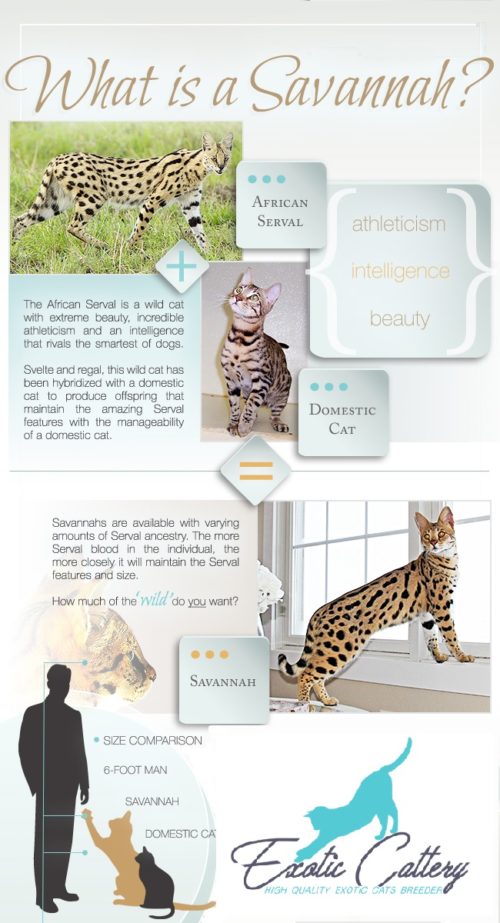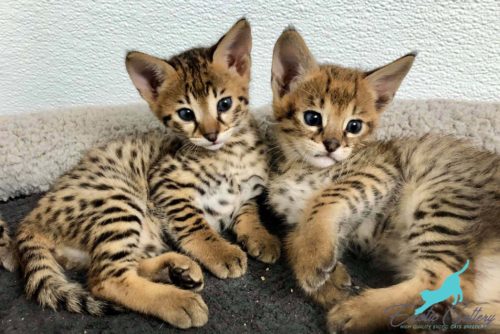Savannah Cat Breeds
Buy Savannah kittens
Savannah Cats in 2024: Are you fascinated by the exotic allure of hybrid cats? The Savannah cat stands out as one of the most sought-after and unique feline companions in the world. With a heritage that combines the wild instincts of the African Serval and the temperament of domestic cats, these felines are not only visually striking but also highly intelligent and interactive. However, before you dive into Savannah cat ownership, it’s crucial to understand the breed’s specific needs, from their temperament to medical care, and even the challenges posed by their large size.
What is a Savannah Cat?
Savannah Cat Breed History
Savannah Cat Breed History: The Savannah cat is a relatively new breed, but it carries a rich history that’s rooted in both wild and domestic ancestry. It all started in the 1980s when breeders like Patrick Kelley and Joyce Sroufe embarked on an ambitious project. They sought to combine the exotic look of the African Serval with the domesticity of house cats, leading to the birth of the F1 Savannah cat. These first-generation hybrids carried about 50% Serval DNA, making them the most wild in appearance and behavior.
As breeders continued their work, subsequent generations such as F2, F3, and so on, were produced. Each generation saw a decrease in wild traits, making these cats more suited for domestic life while retaining their striking, exotic looks. The International Cat Association (TICA) was instrumental in officially recognizing the breed, which further cemented its place in the world of exotic pets. Learn more about the history and evolution of Savannah cats.
If you’re curious about where the name “Savannah” comes from, it’s inspired by the African Savannah, the natural habitat of the Serval. This connection to their wild roots is a huge part of their allure. Understand the importance of these roots when considering the breed.
Understanding Savannah Cat Size and Appearance
Savannah Cat Size: When it comes to size, Savannah cats are known for their tall, lean bodies that can easily dwarf most other domestic cat breeds. Their size varies significantly depending on the generation. For instance, an F1 Savannah cat can weigh anywhere from 15 to 25 pounds and stand about 17 inches tall at the shoulder. Later generations like the F4 Savannah cat tend to be smaller but still impressive, with an athletic build and long legs. Explore more about Savannah cat sizes and how they compare across generations.
Appearance: These cats are instantly recognizable by their spotted coats, which closely resemble that of their wild ancestors. The coat patterns can include bold spots, stripes, and a mix of both, giving them a look that’s both wild and elegant. The large, pointed ears and long necks add to their distinctive appearance, making them one of the most sought-after exotic cat breeds. Learn more about the physical traits of Savannah cats.
Savannah Cat Coat Patterns: The coat pattern of a Savannah cat is a key part of its appeal. It’s not just about aesthetics—these patterns also reflect their wild lineage. Find out how coat patterns vary by generation and what to expect when choosing your cat.
Savannah Cat Size Comparison Table
| Generation | Weight (lbs) | Height (inches) |
|---|---|---|
| F1 | 15-25 | 16-18 |
| F2 | 12-20 | 14-17 |
| F3 | 10-17 | 13-16 |
| F4 | 8-15 | 12-15 |
| F5 | 7-13 | 11-14 |
Compare the size and characteristics of F1 to F5 Savannah cats to determine which generation best fits your lifestyle.
Savannah Cat Temperament and Behavior
Savannah Cat Temperament: If you’re considering a Savannah cat, it’s crucial to understand their temperament. These cats are highly active, intelligent, and curious, often compared to dogs in their loyalty and behavior. Savannah cats are known for their love of water, so don’t be surprised if your feline friend joins you in the shower or splashes around in their water bowl. Learn about their unique temperament traits and how they differ from other cat breeds.
Despite their wild heritage, Savannah cats are very social and can bond strongly with their owners. They’re great with families but require plenty of interaction and stimulation to prevent boredom. This breed isn’t for someone looking for a low-maintenance pet; Savannah cats thrive in environments where they have space to roam and toys to engage their minds. Explore the social nature of Savannah cats and how they fit into a household.
Behavior: It’s also important to note that Savannah cats can be territorial and may not get along well with other pets, especially smaller animals. Their high prey drive, inherited from the Serval, means they’re natural hunters. However, with proper training and socialization, they can coexist with other pets. For tips on managing a Savannah cat’s behavior, check out our detailed guide.
For those wondering if they can handle such an active pet, consider the ownership challenges before making a decision. Savannah cats require more attention and care than most other breeds, but the rewards are well worth the effort.
Savannah Cats as Pets: Owning a Savannah cat is an experience like no other. These cats are highly intelligent and can be trained to do tricks, walk on a leash, and even fetch, much like a dog. However, their intelligence means they can also get into trouble if left unstimulated. Learn how to keep your Savannah cat entertained and prevent destructive behavior.
Are Savannah Kittens Incurable? There’s a lot of misinformation out there about the health of Savannah kittens. While they are generally healthy, like all breeds, they can be prone to certain conditions. It’s crucial to choose a reputable breeder who conducts thorough health checks. Understand the health risks and ensure your kitten is well-cared-for from the start.
For anyone concerned about the longevity and health of a Savannah cat, discover what to look for when selecting a kitten and how to maintain their health over the years.
Savannah Cat Ownership and Care
Savannah Cat Ownership: Deciding to own a Savannah cat is a big commitment. These cats are not just beautiful; they’re also demanding in terms of care and attention. Before bringing one into your home, it’s essential to understand the responsibilities involved. Savannah cats are highly energetic and require ample space to play and explore. They thrive in environments where they can express their natural instincts, such as climbing and hunting. If you’re considering a Savannah cat, explore the specific care requirements to ensure your home is prepared for their unique needs.
Feeding a Savannah Cat: Their diet is another crucial aspect of ownership. Savannah cats benefit from a high-protein diet, similar to what their wild ancestors would eat. This can include raw or specially formulated cat foods that cater to their nutritional needs. Learn more about the best feeding practices to keep your Savannah healthy and active.
Savannah Cat Medical Care: Regular veterinary care is a must for Savannah cats. Due to their hybrid nature, they may require specialized medical attention, particularly regarding vaccinations. It’s important to find a vet who is familiar with exotic breeds. Vaccination practices for Savannah cats might differ from those of other cats, and knowing the difference between killed and modified live vaccines is critical.
Savannah Cat Ownership Challenges
Owning a Savannah cat comes with its set of challenges. For instance, these cats are known for their incredible jumping ability—some can leap up to eight feet in the air! This means you’ll need to Savannah-proof your home to prevent them from getting into places they shouldn’t. Check out tips on how to manage these challenges and ensure a smooth transition for your new pet.
Additionally, Savannah cats can be more demanding in terms of attention and stimulation. They don’t do well when left alone for long periods, so if you’re someone who is away from home often, this might not be the right breed for you. Discover how to keep your Savannah cat engaged and prevent boredom-related behaviors.
Legal Considerations: Before you decide to own a Savannah cat, it’s also essential to be aware of the legal regulations in your area. In some places, owning a Savannah cat might be restricted or require special permits due to their wild ancestry. Check the legality of owning a Savannah cat in your region to avoid any potential issues.
For additional Savannah cat information, read the FAQ’s page.
Unlike owning a Serval, no permits are needed to own a Savannah. Savannahs require no special care beyond the care you would give a domestic house cat. Since they don’t require a special diet, we recommend high quality, dry food. Savannahs use a litter box. And they make ideal house pets, getting along well with other pets and children.
Exotic Cattery has F1, F2, F3, F4, and F5 kittens ranging from 65% to 5% Serval. Sterile until the 4th/5th generation, male Savannahs are available as pets only. Females of all generations are fertile. Most can be purchased as pets or purchased with breeding rights for an additional fee. Achieving extraordinary beauty is not an easy task.
Female Savannah Kittens
- F1: $5,000 – $9,000
- F2: $3,500 – $5,000
- F3: $2,000 – $3,000
- F4: $1,000 – $2,500
- F5: $1,000 – $1,500
Want More Info?
You can learn more about the different generations on the Which Cat is Right for You page.
Savannah Cats as Pets
Savannah Cats as Pets: If you’ve done your research and feel ready to take on the challenge, owning a Savannah cat can be incredibly rewarding. These cats are known for their loyalty and can form deep bonds with their owners. They’re often described as dog-like in their behavior, following their owners around and enjoying interactive play. Explore the pros and cons of Savannah cats as pets to see if they’re the right fit for your family.
Socialization: Socialization is key to ensuring that your Savannah cat grows up to be well-behaved and friendly. Early exposure to different people, pets, and environments can help mitigate any aggressive or shy tendencies. Learn how to properly socialize your Savannah cat for a smoother integration into your household.
Are Savannah Kittens Incurable? There’s a common misconception that Savannah kittens are prone to incurable health issues. While they can be susceptible to certain conditions, responsible breeding and regular veterinary care can mitigate most risks. Find out more about the health of Savannah cats and how to ensure they live long, healthy lives.
Finding a Savannah Cat
Savannah Cat Breeders 2024: If you’re convinced that a Savannah cat is the right pet for you, the next step is finding a reputable breeder. In 2024, it’s more important than ever to choose a breeder who prioritizes the health and well-being of their cats. Check out our guide to finding the best Savannah cat breeders to start your journey.
Savannah Cat Adoption: Alternatively, you might consider adopting a Savannah cat. There are many rescue organizations and adoption centers that specialize in exotic breeds. Learn more about adopting a Savannah cat and giving a cat in need a loving home.
Buying Savannah Cats Online: For those who prefer to buy, there are options to purchase Savannah cats online. However, it’s crucial to be cautious and ensure that you’re dealing with a reputable seller. Find out how to safely buy Savannah cats online and what to look for in a trustworthy breeder.
Savannah Cat Price 2024: The price of Savannah cats can vary widely depending on their generation, with F1 cats being the most expensive. In 2024, you can expect prices to range significantly, so it’s important to budget accordingly. Explore the current pricing for Savannah cats and what factors influence the cost.
Savannah Cat Supplies: Once you’ve secured your Savannah cat, the next step is ensuring you have all the necessary supplies. This includes everything from high-quality food to toys and grooming tools. Check out our recommended Savannah cat supplies to make sure you’re fully prepared.


